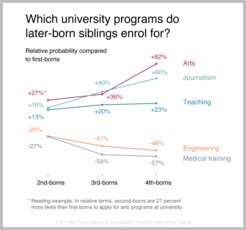Later-borns choose less prestigious programmes at university

First-born children tend to choose more prestigious university programmes such as medicine or engineering than their later-born siblings. These are the findings of a new study published in the science journal Social Forces by researchers Kieron Barclay and Mikko Myrskylä from the Max Planck Institute for Demographic Research, together with Martin Hällsten from the University of Stockholm.
These research findings from scientists at the Max Planck Institute for Demographic Research (MPIDR) in Rostock, Germany, and Stockholm University, Sweden, build upon earlier findings by other researchers that show that later-borns attain lower education than first-borns, and earn less money.
The MPIDR researchers investigated birth order differences in the choice of university subject between siblings in Sweden. They found that the subject choices of siblings explained half of the gap in their long-term earnings.
"Our results suggest that parents invest more in earlier-born children than in later-borns and that this shapes sibling differences in ability and ambitions even within the family," says MPIDR demographer Kieron Barclay, who now published his findings together with MPIDR director Mikko Myrskylä and Martin Hällsten from Stockholm University in the journal Social Forces.
"The differences we found are not a simple distinction between first-borns and all other later-born siblings", says Kieron Barclay. "For example, second-borns are less likely to study medicine than first-borns, and third-borns are less likely to study medicine than second-borns."

In relative terms, second-borns are 27 percent less likely than first-borns to apply to medical training programmes, and the difference between first-borns and third-borns was 54 percent.
The researchers also found that the relative probability of second-borns studying arts programs was 27 percent higher than for first-borns, while the difference was 36 percent between third-borns and first-borns. (See graph for all subjects up to fourth birth order.)
"Sibling differences in choice of university program was not just a consequence of first-borns having better grades in school," says Kieron Barclay. "When we controlled for grades from upper-secondary school, the birth order differences in university programs persisted. This suggests that the home environment shapes attitudes and preferences beyond academic ability."
Although the new MPIDR study did not deal with the explanation for these birth order differences, it seems like that parental care plays a crucial role. "First-borns benefit exclusively from parents' attention as long as they are the only child at home," says Mikko Myrskylä. "This gives them an early head start."
For their study the researchers used Swedish administrative register data. All families where at least two siblings had applied to a university program were included in the analysis. Overall the study examined 146,000 students born between 1982 and 1990, who enrolled at university during the years 2001 to 2012.
More information: Kieron Barclay et al. Birth Order and College Major in Sweden, Social Forces (2017). DOI: 10.1093/sf/sox069
Provided by Max Planck Society



















